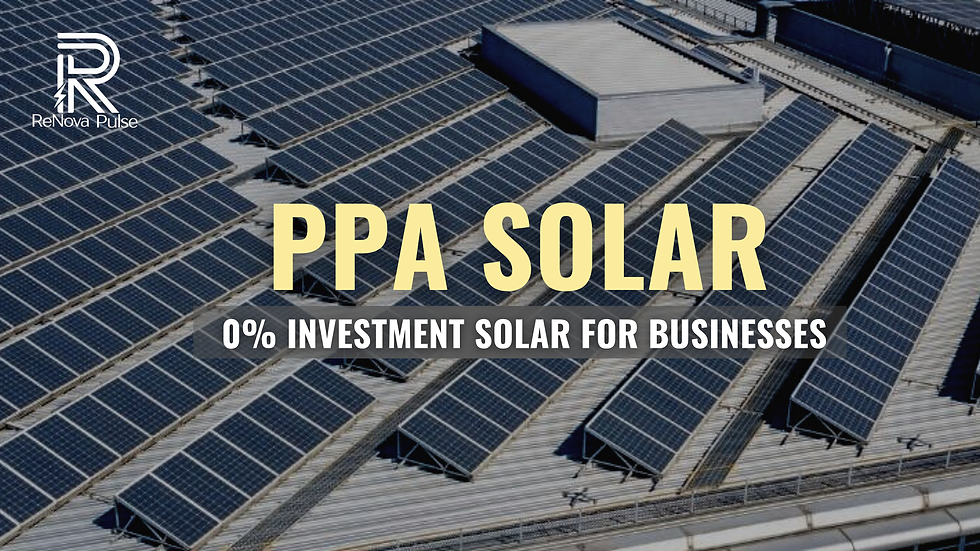How Solar Panels Work: A Beginner’s Guide to Harnessing Solar Energy
- Team ReNova

- Mar 20, 2025
- 4 min read

Solar energy is undoubtedly one of the cleanest, most plentiful and least expensive sources of power available. How does solar energy actually use sunlight to generate electricity for the home or office? If one has never heard about solar energy before and is curious about the actual working of solar energy, this beginner's guide will explain it to the reader gradually.
About Solar Energy
The sun emits energy in the form of light and heat. Solar panels absorb this energy and transform it into electricity for use by the home or the business through the photovoltaic effect.
In short: Sun hits solar panels→Solar panels generate electricity→Electricity is used or stored for future use.
Components of Solar Systems
Solar panel systems consist of several important components:
Solar Panels (Photovoltaic Cells): Convert sunlight to electricity.
Solar Inverter: Converts DC electricity into AC electricity, which is suitable for home use.
Solar Battery (Optional): Stores surplus energy for later use.
Charge Controller: Regulates flow of power to prevent overcharging of batteries in off-grid systems.
Net Metering System: Sends excess electricity back into the grid, lowering electricity bills.
How do solar panels produce electricity?
Step 1: Collecting Sunlight
Photovoltaic (PV) cells, which change light into electrical energy, are part of a solar panel. Made of semiconductor materials like silicon, these cells absorb sunlight and create an electric field.
Step 2: Production of Electricity
Such movement of electrons results in the generation of direct current (DC) electricity in PV cells, as soon as sunlight strikes them.
Step 3: Making Power Usable
Most of the household appliances are dependent on AC electricity. AC power generated from solar inverter is to convert DC power into AC.
Step 4: Powering Your House or Office
Converted electricity into AC would provide power for household appliances, lighting, and devices.
Step 5: Storing or Selling Extra Energy
A solar battery saves excess energy for future use. In case of interconnection with electricity grid, the excess energy is fed back via net metering to reduce the electric bill.
Types of Solar Systems
Three types of solar power systems are there in India:
On-grid Solar System
Connected to electricity grid, depends less on conventional power.
Off-grid Solar System
Independent operating battery systems, proper for remote areas.
Hybrid Solar System
Both on-grid and off-grid characteristics, power backup, and grid connectivity.
Advantages of Solar Energy for Homes and Business
Less Electricity Bills: Reduces dependence on the power grid, which entails a considerable savings in the long run.
Environment-Friendly Energy Source: Solar energy is renewable and lessens carbon emissions.
Low Maintenance Cost: Minimal maintenance is required for solar panels, which can last for more than 25 years.
Grants Offered by the Government: Financial assistance is provided by the Indian Government for solar panel installation.
Increases the Property Value: Solar panel installation makes homes and businesses more attractive to buyers.
Solar Panel Myths
Myth: Solar panels do not work on cloudy days.
Truth: They still produce power on cloudy days, albeit at lesser efficiencies.
Myth: Solar power is too expensive.
Truth: The costs have now come down drastically; grants help in subsidizing installation expenses.
Myth: Solar panels need a lot of maintenance.
Truth: Some occasional cleaning and inspection are done for optimal performance.
What about Solar Energy for you?
Things to consider before buying solar panels in India:
Available Roof or Land Space: Should have enough space to install the solar panels.
Electricity Consumption: The more you consume, the more savings with solar power.
Government Incentives: Find out whether you're eligible for solar subsidies in India.
Net Metering Policy: You can draw the most benefit from this policy by supplying excess power generated back to the grid and reducing your bill.
Switching to solar is a smart investment, and ReNova Pulse Energy brings to you a rather seamless transition. Be it rooftop solar or ground-mounted solar systems; our experts ensure that you get the right solution that is maximally efficient and cost-effective according to your energy needs.
Get a Free Consultation Today!
Let us help you harness the power of the sun and reduce all your electricity bills. Call ReNova Pulse Energy for a free consultation now and take your first step towards a sustainable future!
Frequently Asked Questions
How do solar panels work step by step?
Solar panels absorb sunlight, convert it into direct current (DC) electricity, then an inverter converts it into usable alternating current (AC) for homes. Excess energy can be stored or sent to the grid.
How do solar panels work in simple terms?
Solar panels capture sunlight and turn it into electricity, which powers appliances and reduces reliance on traditional energy sources.
How much power does a 6.6 kW solar system produce per day?
A 6.6 kW solar system typically generates around 24–28 kWh per day, depending on location, sunlight hours, and efficiency.
Do solar panels work at night?
No, solar panels do not generate electricity at night. However, stored battery power or grid electricity can be used when the sun isn’t shining.
Do solar panels work in winter?
Yes, solar panels work in winter, but efficiency may decrease due to shorter daylight hours and potential snow coverage.
How long do solar panels last?
Most solar panels have a lifespan of 25–30 years, with efficiency gradually reducing over time.
_edited.png)
.png)




.png)
Comments